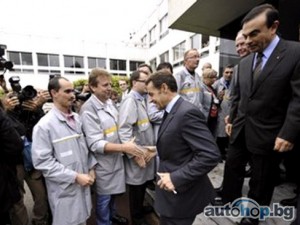Renault welcomes French government measures
The €3 billion loan granted by the French government is particularly welcome amid today’s credit crisis. Combined with the efforts made by the entire company, it will enable Renault to withstand the crisis and, notably, finance its strategic projects in France, particularly the development of vehicles with zero or very low CO2 emissions.
Carlos Ghosn, President of Renault, said: "We are very pleased with the loan granted to us by the French government. In light of the exceptional crisis impacting our entire industry, access to credit was indispensable for supporting our activity and that of the automotive industry. It will also enable us to pursue our developments and investments in sustainable mobility.
The French government has also increased the authorization of the SFEF loan to RCI from €500 million to €1 billion, enabling RCI to maintain a competitive financing offer for its customers.
Serving its customers in France for 110 years, Renault is, as a responsible company, renewing the commitment made by Carlos Ghosn in September 2008 to not close a vehicle assembly plant in France in the coming years. Industrial activity in the country will be buoyed by the launch of fivenew models and a brand-new engine between now and end-2012. A full-electric vehicle will also be developed in France once the necessary profitability conditions are in place.
Renault is also committed to developing, principally in France, systems and technologies for clean vehicles and to maintaining the necessary research, engineering and test resources in the country.
Renault will develop medium-term partnership programs with its partner equipment suppliers and will examine the creation in France of a research unit on electric vehicles and a battery production site.In addition, Renault will allocate its income as a priority to strengthening its equity and investments to give itself the resources needed to pursue development.
The elimination of the business license tax in 2010, a decision taken by the French President, will strengthen Renault's competitiveness in France. To go further, the company has made the commitment to collaborate with the government and employee and management representatives, between now and end-June 2009, in order to examine the conditions for implementing a concerted effort enabling a structural catch-up in competitiveness in order to once again increase the share of France in European vehicle production.
In the shorter term, Renault will do everything it can to maintain jobs and skills, at production sites as well as research, engineering and test centers. It will not implement restructuring programs at its automotive plants in France in 2009. Renault will continue to work with the government and employee and management representatives so that, throughout the crisis period, periods of partial activity are organized respecting the conditions of all parties.
Lastly, Renault cannot grow without solid suppliers. The Group has already reduced its payment times from 90 days to 60 days in line with the Economic Modernisation Act. It will further improve its support for companies in the automotive sector by:
. contributing actively to the roll-out of an automotive charter;
. implementing the code of good practices and competitiveness negotiated by the CCFA (Committee of French Automobile Manufacturers) and the representative bodies of equipment suppliers and subcontractors;
. doubling its contribution to the Automobile Investment Fund (to a total €200 million) to facilitate the consolidation needed for the emergence of globally competitive players.
In this new context, the entire company is rallying to get through the crisis and come out of it in good health. To do so, Renault is pursuing efforts in its three strategic areas: top-three on quality, growth in international markets, and sustainable mobility.
 Фетел: Пилотите готови да дискутират с ФИА супе...
Фетел: Пилотите готови да дискутират с ФИА супе...
10 февруари 2009
Коментари
Все още няма коментари. Бъдете първите, които ще изразят мнението си!




 Вицепрезидентът на Дженерал Моторс ще се пенсионира в края на годината
Вицепрезидентът на Дженерал Моторс ще се пенсионира в края на годината






